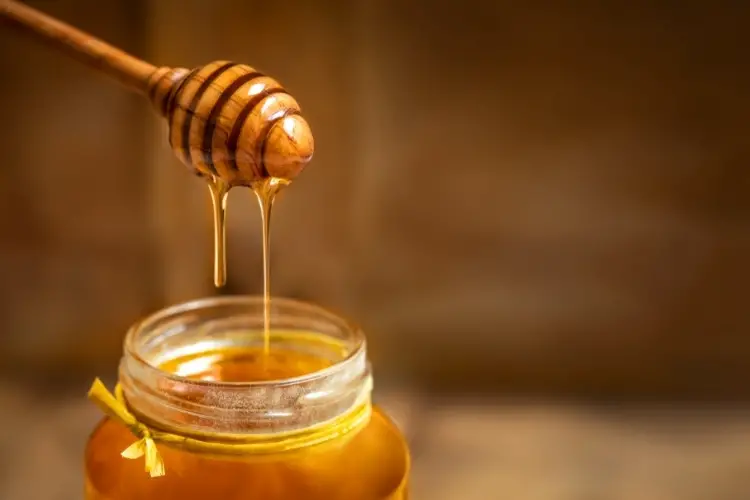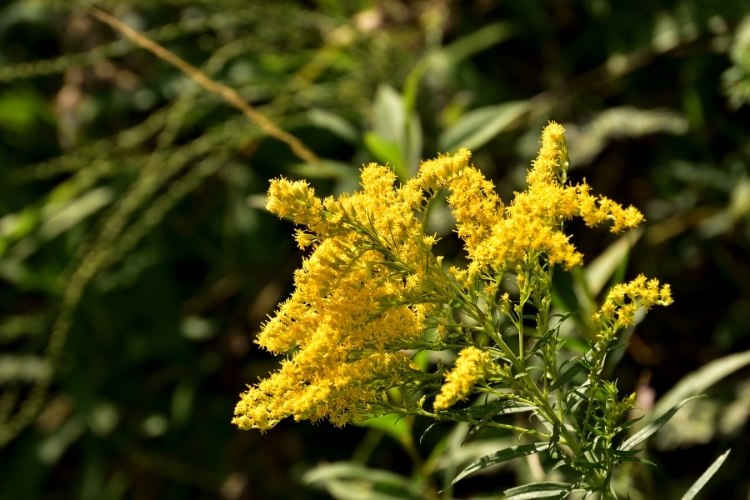Honey is a sought-after product characterized for its sweet smell. However, sometimes this delicious treat can have odors that can be off-putting.
There are 3 main reasons your honey smells bad. The nectar comes from flowers that smell funny, your honey is contaminated or your honey fermenting.
[Note: I’m talking about honey after extraction. If the smell is coming from your beehive (whether you think the source is the honey or not), I encourage you to read to a previous about it, as something more serious can be going on in your hive.]

Is Honey Supposed To Smell?
Yes! Honey is supposed to smell. And by this, I don’t mean it always smells bad (although this is very subjective), but it always smells like something.
You see, honey’s flavor and aroma are much more diverse than most people think. It’s so varied that researchers at the University of California, Davis, developed a full honey flavor and aroma wheel showing all the different notes people can experience when tasting honey.
Why Does Raw Honey Stink?
Raw honey is honey that hasn’t been processed. As some may say, it’s the honey that comes from the beehive to the table. People who are not used to consuming raw honey can find its aromas and flavor overwhelming, and at times, off-putting.
Honey found in supermarkets doesn’t have strong smells or aromas because they are pasteurized to kill all the naturally present yeast spores and other microorganisms. This process ensures the honey doesn’t ferment and maintains its attractive runny texture. However, heating honey also alters its properties, like the aromas and flavors present in its raw form.
Reasons Why Your Honey Could Smell Bad
If you are unsure whether the smells coming from your honey mean, here are the main reasons why this happens and what to do about it.
Reason 1: The Source Of Nectar
Many beekeepers run into a honey harvest where their honey gives off a funny and unusual smell. As you can imagine, it’s a troubling experience that sends most into panic mode.
But panic not! The bad smell doesn’t necessarily mean something is wrong with it. It can be just an indication of the vegetation blooming nearby.
As Dr. El Ghazali explains, both the smell and taste of honey come from the source of nectar bees used to make it. In other words, the properties of honey, including aroma and flavor, depend on the chemical composition of the plants that produce the nectar.
Maybe this time, your bees ran into flowering plants that, unfortunately for you, have a less pleasant smell.
Some of the most common sources of stinky honey and their characteristic smells are:
- Buckwheat honey – smells like farm, barnyard, and even manure.
- Goldenrod honey –smells like dirty or gym socks.
- Aster honey –it smells moldy, rancid, and sour.
- Dandelion honey – the aroma of this honey is described as sour, vinegary, and similar to ammonia.

What To Do With Honey From Flowers That Smell Bad?
I would recommend first identifying the type of flower. You can do this by asking local beekeepers about it. They’ve likely been through this experience, and they know if there are flowers around the area causing your honey to have a strong smell.
The fact that it smells funny doesn’t mean it also tastes unpleasant, but it might have a strong flavor. If you like the taste, use it. If you are confident it hasn’t been contaminated, it should be safe for human consumption.
If you don’t like the taste, it can still be used for cooking. You can also give it back to your bees or simply ask your friends and family if they want it.
How To Avoid Getting Honey From Smelly Flowers?
If this weird-smelling honey is a big issue for you – maybe you sell your honey and are afraid the smell will make it less attractive, then you might want to cut the source from the root.
Since honey comes from the nectar your bees collect, the best way to prevent this is by offering plenty of flowers they can forage from that will produce honey that smells and taste better.
Reason 2: Your Honey Got Contaminated
Honey is known to ‘not spoil’ due to its high pH (making it acidic), high sugar content, and low moisture. This combination of properties makes it hard for most microorganisms to survive and reproduce.
Nevertheless, as it gets extracted and comes into contact with other substances, it can increase the number of microbes present and the risk of its properties changing.
What To Do With Contaminated Honey?
If you suspect your honey has been contaminated and unsafe to eat, the best thing is to throw it away. Risking your health and other people’s is not worth it – as painful as throwing honey away can be.
How To Prevent Honey Contamination?
To avoid having this issue in the future, make sure you prepare the tools and space where you extract honey. This includes cleaning and sanitizing the utensils and surfaces you use during the process.
The way you store honey is also crucial. Avoid using metal and plastic recipients as they can interact and transfer aromas and flavors to your honey. Instead, use glass jars that can be closed tightly so you can ensure they are keeping moisture and other particles away from your honey.
Reason 3: Your Honey Is Fermenting
Another common cause of honey giving off a bad smell is fermentation.
Fermentation most often occurs when the moisture content of honey is high enough to allow the reproduction of the yeast naturally present in honey. As these organisms break down the sugars, they unchain chemical processes that substantially change the properties of your honey.
If you suspect your honey is fermenting, I wrote a complete article about fermented honey, how to know if it’s fermenting and what to do about it.
How To Prevent Your Honey From Fermenting?
To avoid dealing with fermented honey, you can freeze it, pasteurize it or make sure it has the right moisture content. Ideal moisture content can range between 17% – 21%. Anything higher than this will represent an increased risk of fermentation, and it’s recommended you apply corrective measures.
It’s recommended you measure the water content with a honey refractometer before extraction because honey dries out more effectively when it’s still in the frames.
Freezing honey can also help you preserve your honey if you can’t reduce the moisture. This will maintain the yeast spores inactive for the time it remains in low temperatures. However, once it returns to ambient temperature, you should aim at using it quickly.
Pasteurizing honey is the most complicated solution. It requires heating the honey at specific temperatures and time frames. Done right, pasteurization will effectively eliminate the natural yeast spore and other microorganisms but will also alter its properties like its taste.
Summing up…
If you have honey that smells bad in your hands, the most likely causes are nectar from a flower that smells funny, contamination, and fermentation.
Identifying the cause is essential as it will help you decide what to do with the honey and avoid it from happening again.
